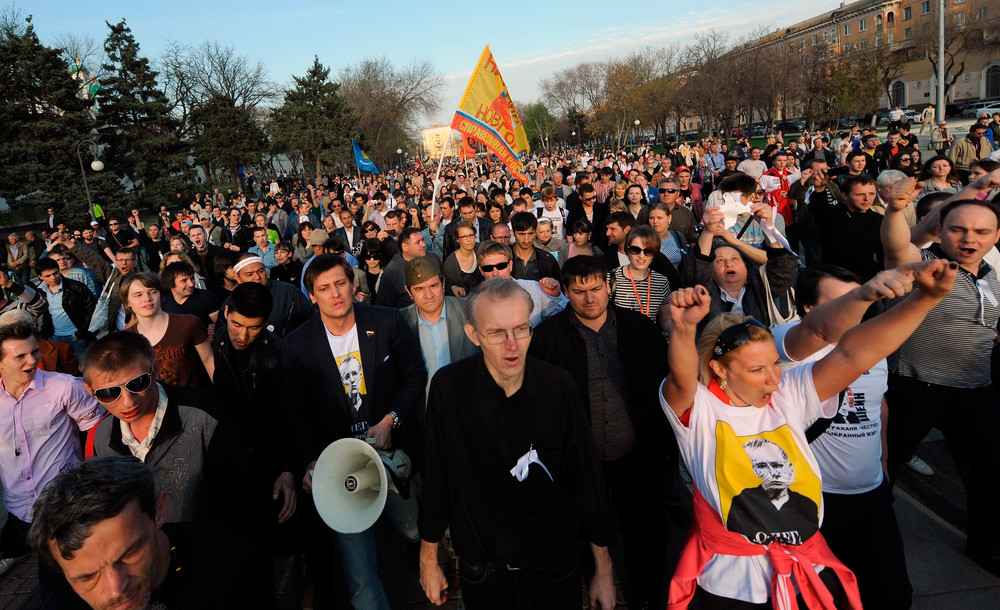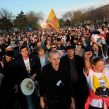
Putin Tries to Talk the Crisis out of Escalation
Publication: Eurasia Daily Monitor Volume: 9 Issue: 75
By:

Orthodox Easter was celebrated in Russia last Sunday with all the ceremonial pomp and official hypocrisy, but it has hardly produced any calming effect on the brewing political crisis. Ahead of his return to the Kremlin, Prime Minister Vladimir Putin’s last official address to the State Duma sought to cap his term as head of government with inevitable references to “emotional upheavals and political battles” (Kommersant, April 12). He appeared calm and confident, praising himself for steering the country through economic turbulence and setting goals for the new government in the most general and uncontroversial terms (Nezavisimaya Gazeta, April 12). The newly-elected parliamentarians, however, showed rather little enthusiasm for his course on unwavering stability, and one opposition party even dared to walk out of the hall (Ezhednevny Zhurnal, 12 April). The point of that protest was the conflict in Astrakhan where mayoral elections had been so blatantly rigged that Oleg Shein – whose victory was stolen – and several of his colleagues have gone on a hunger strike (Moskovskie Novosti, April 13).
Putin dismissed that local turmoil as an inconsequential episode of the big story of renewed public support for his sovereign rule, which the bad losers from the opposition seek in vain to undermine. He maintains that economic growth provides an unshakeable foundation for this support and reassures his “working class” voters that Russia is on track to become the fifth largest economy in the world, set to overtake Germany in a few years (Newsru.com, April 12). Germany may indeed suffer from a coming deep recession in the euro-zone, but it is certain to affect Russia as well, while the stifling state control over key industrial and financial sectors that Putin intends to tighten and expand makes Russia’s prospects highly problematic (Vedomosti, April 12). President Dmitri Medvedev admitted last week that the predatory prosecution of entrepreneurs in Russia was destroying all incentives for investment, but Putin did not mention this issue at all, avoiding also the ugly theme of corruption; so his pledge to improve the investment climate rings hollow and false (Vedomosti, April 11).
The Ministry for Economic Development has presented its forecast for Russia’s steady growth, which should have substantiated Putin’s vision. But the best efforts of its experts produced the figure of 4.4 percent, with the more conservative estimate of 3.5 percent – close to what is expected this year (Newsru.com, 13 April). The best option envisages the blossoming of a “competitive innovative sector” driven by the inflow of private investment, which remains a figment of bureaucratic imagination, and the second-best scenario accepts the continuing dominance of the oil-and-gas sector underpinned by the steady climb of prices (Gazeta.ru, April 13). Putin insists that his social promises “are not connected with oil and gas revenues” and will be fulfilled whatever the volatility on the global energy markets. But Elvira Nabiullina’s ministry admits that the state budget is certain to run into deficit and that even a slight drop in the oil price would necessitate cuts in expenditures (Novaya Gazeta, April 13).
The denial of the severe dependency of the investment-starved and capital-exporting economy on petro-revenues is not merely unconvincing, it is self-deceptive because the oil business is seriously over-taxed, while the gas sector is stagnating due to Gazprom’s fast-progressing inefficiency. Last week, a group of oil companies appealed to Putin to revise the legislation that reserves hydrocarbon exploration and development rights on the continental shelf to state-owned companies (RBC Daily, April 13). This enacting of the creed of “resource nationalism,” which is close to Putin’s heart, has brought development of the promising “green fields” from Sakhalin to Shtokman to a near complete stand-still as Gazprom and Rosneft are interested primarily in preventing competitors from advancing innovative projects in partnership with Western “majors” (Forbes.ru, April 13). Putin agreed to give the appeal some thought but in practical terms suggested a package of long-term tax breaks for the state-owned companies that should convince them to get serious about using and not merely enjoying their privileges (Kommersant, April 13).
This example presents a general problem for Putin’s new presidency: Reforms are urgently needed in many areas, from the pension system to the rearmament program, but vying clans of courtiers in the Kremlin have vested interests in blocking them. Putin has expressed great respect for Pyotr Stolypin, the prime minister who presided over Russia’s economic boom in the early 1900s, so his 150th anniversary was duly celebrated last week (Newsru.com, April 14). There is a lesson, however, in the fact that Stolypin focused his reforms on the strengthening of property rights, an institution that has been deliberately undermined during Putin’s “era” (Vedomosti, April 13). Stolypin had a vision of a “great Russia” and pleaded for 20 years of stable development on the eve of WWI. Putin now vows that his six-year-long presidency (after which another might follow) will make this vision come true. He is blind to the historic irony of the situation where his stagnant stability leads directly to those “great upheavals” that Stolypin so desperately hoped to avoid. A more worrisome historic parallel could be found in the start of Stolypin’s course, when he had to resort to severe repressions against revolts and mutinies commonly known as the “Revolution of 1905” (Kommersant-Weekend, April 6).
Putin’s regime has no stomach for unleashing repressions and hardly much confidence in the reliability of the shamelessly corrupt police, but the regime’s responses to direct challenges are often inadequate and driven by very personal fears of losing its ill-gotten fortunes. The street protests that have spilled over from Moscow to several regions and are now gaining momentum in Astrakhan are not aimed at toppling the regime but rather at proving its impotence. Putin tries to exploit his “fatherly” appeal with the “working masses,” but the members of the ruling bureaucracy know that they have nothing in common with the “have-nots” and feel the discontent of the upper-middle class, with which they share plenty of money interests. So much legitimacy has been lost in the six months of election mismanagement that the proposition “Forward with Putin” is changing in the minds of many into “Down with Putin.”




